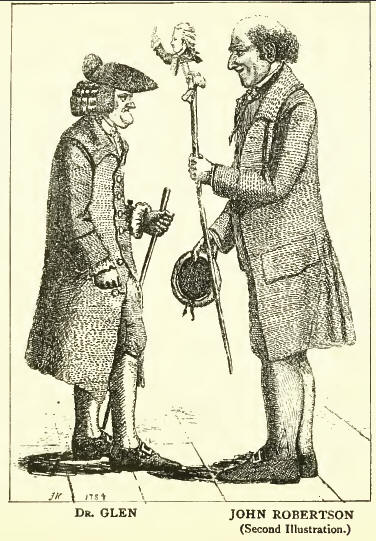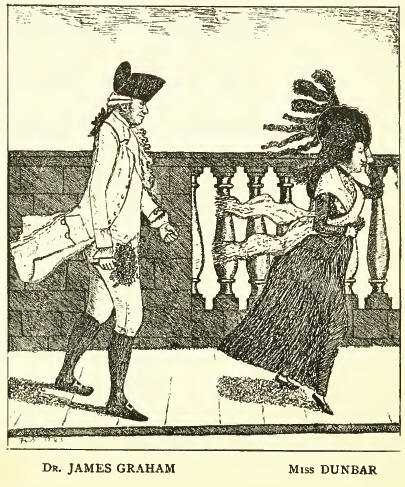Henry Home, Lord Karnes, well known by his numerous works on law and
metaphysics, was a judge of the Courts of Session and Justiciary.
He
was born in the county of Berwick, in the year 1695, and was descended
of an ancient but reduced family. But it was to his own exertions, his
natural talent and profound legal knowledge, that he was indebted for
the high rank and celebrity he subsequently attained; for his father was
in straitened circumstances, and unable to extend to him any such aid as
wealth could afford.
His lordship was early destined for the
profession of the law, in which he wisely began at the beginning, having
started in his career as a writer's apprentice, with a view of acquiring
competent knowledge of the forms and practical business of courts. After
long and successful practice at the bar, he was raised to the bench, and
took his seat 6th February, 1752.
Lord Karnes possessed a flow of
spirits, and a vivacity of wit, and liveliness of fancy, that rendered
his society exceedingly delightful, and particularly acceptable to the
ladies, with whom he was in high favour. He is accused of having become
in his latter years somewhat parsimonious; what truth may have been in
the accusation we know not.
Notwithstanding the general gravity of his
pursuits, his lordship was naturally of a playful disposition, and fond
of a harmless practical joke, of which a curious circumstance is on
record.
A Mr. Wingate, who had been his private tutor in early life,
but who had by no means made himself agreeable to him, called upon him
after he had become eminent in his profession, to take his opinion
regarding the validity of certain title-deeds which he held for a sum of
money advanced on land. The lawyer, after carefully examining them,
looked at his old master with an air of the most profound concern, and
expressed a hope that he had not concluded the bargain. The alarmed
pedagogue, with a most rueful countenance, answered that he had; when
Mr. Home gravely proceeded to entertain him with a luminous exposition
of the defects of the deeds, showing, by a long series of legal and
technical objections, that they were not worth the value of the
parchment on which they were written. Having enjoyed for some time
Wingate's distress, he relieved the sufferer by thus addressing him—"You
may remember, sir, how you made me smart in days of yore for very small
offences; now, I think our accounts are closed. Take up your papers,
man, and go home with an easy mind; your titles are excellent."
Lord
Karnes, so eminent as a judge and an author, was also an amateur
agriculturist of considerable reputation; and his "Gentleman Farmer" was
long held as a complete vade mecum on the subject of farming. Among
other contemplated improvements, he entertained a notion of the
practicability of concentrating the essence of manure, so as not only to
render the substance more productive, but the mode of application less
laborious. Conversing one day with a tenant, and seeing the immense
quantity of ordinary manure he was laying on a field, Lord Karnes
observed that he could make the full of his snuffbox go as far in
producing a crop. "Gif ye do that," said the doubting farmer of the old
school, "I'll engage to carry hame the crap in my pouch,"
Being on one
occasion at Stirling, in his official capacity as a Lord of Justiciary,
Kames invited Mr. Doig, a teacher there of deserved reputation, to sup
with him. In the company of one so famous as the celebrated Judge, it
was natural that the teacher should display his conversational
acquirements to the utmost advantage. Old Kames was highly amused by the
facetious talents of his guest, and for a time guardedly maintained a
proper degree of etiquette; but a fresh sally of pleasantry breaking
down all formality, out at last came his familiar expression—"Eh, man,
but ye're a queer b—hi" The pedantry of the teacher was perhaps a little
alarmed—"Thank you," said he; "I've often been termed a dog (Doig)
before; but this is the first time I've ever been called a b—t! "
When
Lord Kames was a young advocate at the bar, the Jesuitical Lord Lovat,
who was notorious for his insincerity, had observed his talents ; and
conceiving that he might, in the course of events, become serviceable to
his views, resolved upon making him his friend. Lovat then lived in a
villa somewhere about the head of Leith Walk, and often observed young
Home pass up and down between Edinburgh and Leith. Presuming upon very
slight acquaintance, his lordship one day ran out, and, clasping the
advocate in his arms, began to administer some of those compliments,
which he used to call hirf tveajjons—"My dear Henry," he cried, "how
heartily do I rejoice in this rencontre. How does it come to pass that
you never look in upon me? Almost every day I see you go past my
windows, as if for the purpose of inflaming me with a more and more
passionate desire for your company. Now, you are so fine-looking—so
tall, and altogether so delightful in your aspect, that unless you will
vouchsafe me some favour, I must absolutely die of unrequited passion."
"My Lord," cried Home, endeavouring to extricate himself from his
admirer's arms, "this is quite intolerable; I ken very weel I am the
coarsest and most black-a-vised b—h in a' the Court o' Session. Hae
dune—hae dune!" "Well, Henry," said Lovat, in an altered tone, "you are
the first man I have ever met with who had the understanding to
withstand flattery." "My dear Lord," said Home, swallowing the
compliment with avidity, and returning the embrace, " I am rejoiced to
hear you say so."

Amongst his lordship's
singularities, which were not a few, was an unaccountable predilection
for a certain word, more remarkable for its vigour than its elegance,
which he xxsed freely even on the bench, where it certainly must have
sounded very oddly. This peculiarity is pointed out in the amusing poem,
entitled the "Court of Session Garland," by James Boswell—
"Alemoor the judgment as illegal blames —
"Tis equity, you b—h,'
replies my Lord Kames."
About a week before his death, which was the
result of extreme old age, feeling his end approaching, he went to the
Court of Session, addressed all the judges separately, told them he was
speedily to depart, and bade them a solemn and affectionate farewell. On
reaching the door, however, he turned round, and, bestowing a last look
on his sorrowing brethren, made his exit, exclaiming, "Fare ye a' weel,
ye b—hes! "

Not more than four days
before his demise, a friend called on his lordship, and found him,
although in a state of great languor and debility, dictating to an
amanuensis. He expressed his surprise at seeing him so actively
employed. "Ye b—h," replied Kames, "would you have me stay with my
tongue in my cheek till death comes to fetch me!" A day or two after
this, he told the celebrated Dr. Cullen that he earnestly wished to be
away, because he was exceedingly curious to learn the nature and manners
of another world. He added —"Doctor, as I never could be idle in this
world, I shall willingly perform any task that may be imposed on me in
the next."
Dnring the latter part of his life, he entertained a dread
that he would outlive his faculties, and was well pleased to find, from
the rapid decay of his body, that he would escape this calamity by a
speedy dissolution. He died, after a short illness, on the 27th of
December 1782, in the 87th year of his age.
His lordship lived in the
self-contained house at the head of New Street, fronting the Canongate,
east side, a house which was then considered one of the first in the
city.
The works of Lord Kames are—"Remarkable Decisions of the Court
of Session, from 1706 to 1728," folio; "Essays upon several Subjects in
Law," 1732; "Decisions of the Court of Session, from its first
institution till the year 1740," 1741—two volumes were afterwards added
by Lord Woodhouselee, and a Supplement by M'Grngar; "Essays on several
Subjects concerning British Antiquities," 1747; "Essays on the
Principles of Morality and Natural Religion, in Two Parts," 1751, 8vo;
"The Statute Law of Scotland, abridged, with Historical Notes," 1757,
8vo; "Historical Law Tracts," 1759, 8vo; "The Principles of Equity,"
1760, folio; "Introduction to the Art of Thinking," 1761, 12mo;
"Elements of Criticism," 1762, 8vo, 3 vols; "Remarkable Decisions of the
Court of Session, from 1730 to 1752," 1706, folio; "Gentleman Farmer,"
1772, 8vo; "Sketches of the History of Man," 1773, 2 vols., 4to;
"Elucidations respecting the Common and Statute Law of Scotland," 1777,
8vo; "Select Decisions of the Court of Session, from 1752 to 1768,"
1780, folio; and "Loose Hints upon Education, chiefly concerning the
Culture of the Heart," 1781, 8vo.

